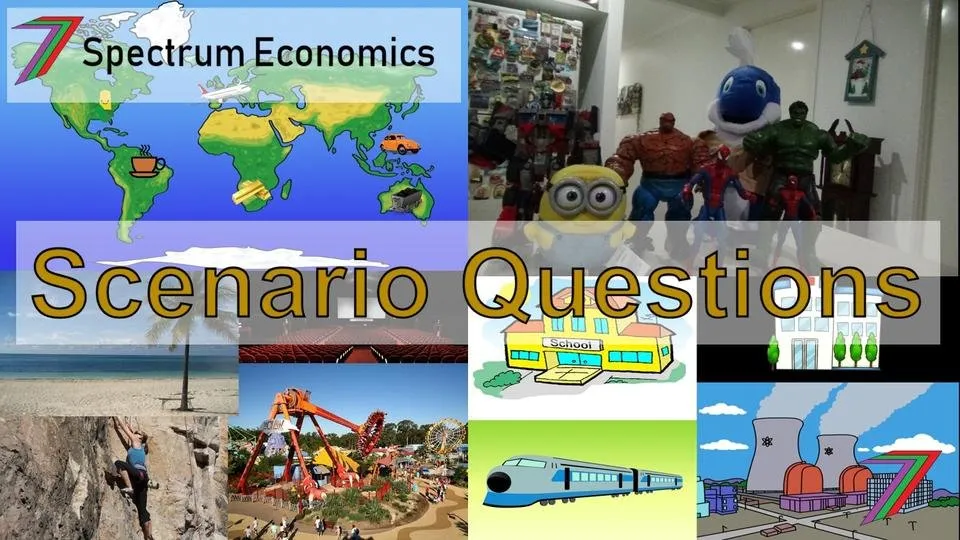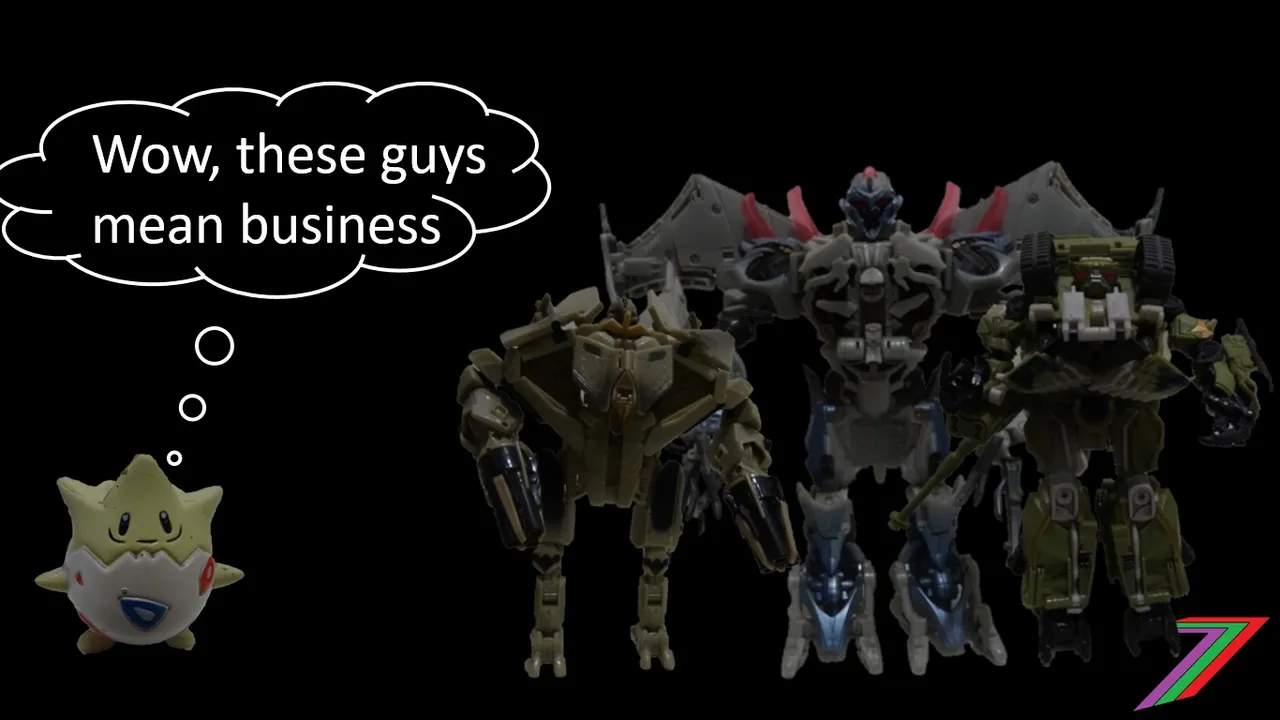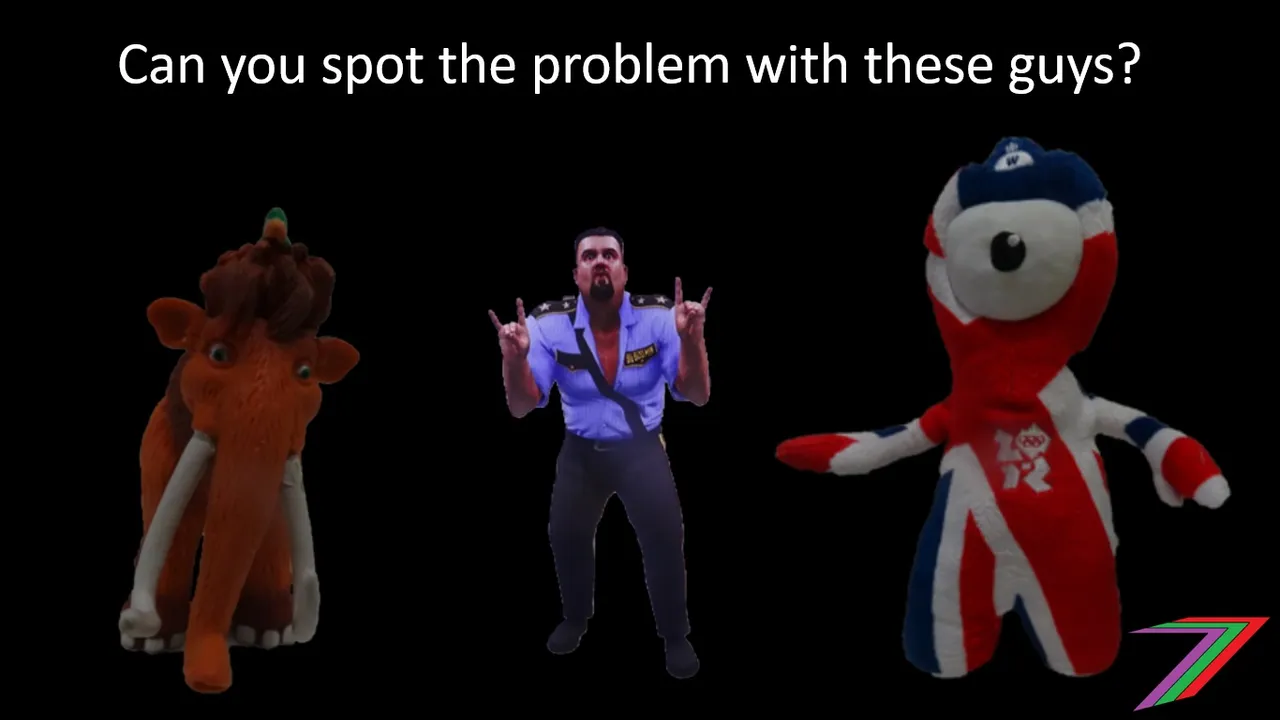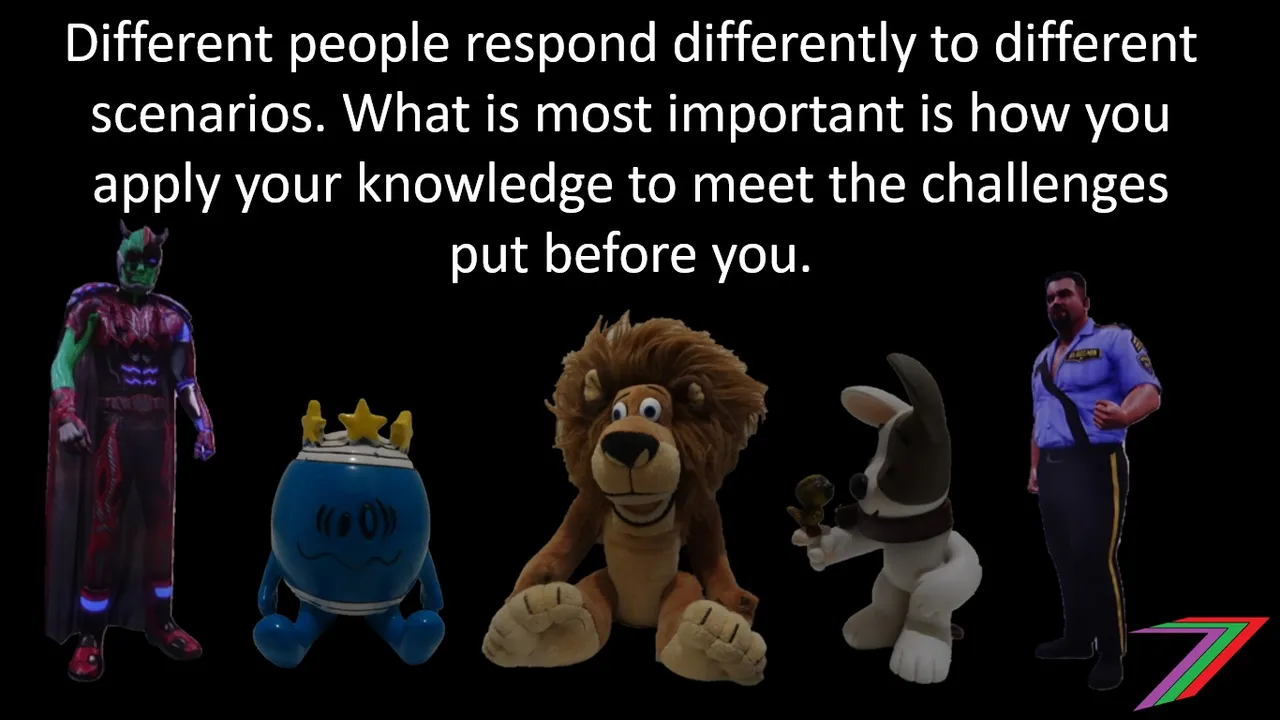Hi Everyone,

Today I would like to discuss using scenarios in economics questions. This post follows on from my post ’Designing an economics course for everyone’ where I discuss designing an economics course that focuses on the real life application of economics. The previous post only briefly discussed possible assessment methods. The types of questions used in my 2018 6-week challenge was suggested as a possible approach.
In this post, I would like to expand upon the idea of using questions that require analysis and a response to a provided scenario. Below are the six questions, which were asked in the 2018 6-week challenge.
- Explain how you have or would adapt your lifestyle to a tighter budget.
- Explain how you gain value out of your life. E.g. watch movies, visit relatives, etc. Explain if you have a formula for happiness.
- Trading game - decide what you will buy or sell, whoever has the most money at the end wins a prize (results will be generated on a spreadsheet and presented in a video). Prizes will also be given out for presenting the logic behind each investment decision. This may sound confusing, don’t worry, the post will explain everything.
- Investment strategy - with the information provided in the post, explain which combination of investments you recommend. Mathematical explanation is optional for this challenge.
- Restaurant game - where would you set up your restaurant? What would you sell? How much would you charge? The post will provide more information on how you can go about doing this.
- Cooperation vs competition game – the post will contain several scenarios where either cooperative or competitive behaviour is possible. The participants need to decide which strategy is better and explain.
Questions 3 to 6 used scenarios for the participants. Whereas, Questions 1 and 2 were open-ended.
What are scenario questions?

Note: I will refer to those attempting questions as participants
Scenario questions require the participant to place himself or herself in a particular position or role. The role faces challenges that the participant needs to attempt to overcome using their own knowledge. The questions will provide plenty of information for the participant to use. The information will rarely be complete; therefore, the participant will often need to make assumptions. The participant will normally need to explain their approach, methodology and eventual course of action. In many cases, the participant will need to explain why they did not take a course of action as well as some of the potential problems regarding the course of action they have suggested.
The scenarios will rarely insist the use of any particular economic theory or concept. However, the question will require the application of some theory and the participant will need to determine, which theories can be applied to help address the question. In some cases, the participant may even need to draw upon knowledge outside of economics. This may appear strange but economists often borrow from other fields of study.
Scenario questions provide the participant with a great deal of flexibility to the approach to the question but also focuses the participant on particular problems that are very clearly defined. Scenario questions are not testing definitions or even knowledge of any particular theory or concept. Instead, they require the participant to draw on knowledge of theories or concepts considered appropriate to address the requirements of the question. It is likely that several theories and concepts can be used to reach workable solutions. To address a person’s knowledge adequately, assignments should consist of scenario questions that draw knowledge from different areas of economics.
I believe the use of scenarios is likely to be a more effective approach to testing participant’s knowledge than simple open-ended questions or questions that require a person to explain a theory with little context to application.
Advantages of scenario type questions

I believe there are several advantages of using scenario questions in assignments. These advantages can be described as follows:
- Scenario questions are flexible and allows the participant the freedom to address the elements in the scenario using any theories or concepts they please.
- Scenario questions are not completely open-ended; therefore, appraisal can be consistent.
- Scenario questions require answers that involve working with the parameters laid out in the question. Generic answers cannot be easily plagiarised and used as a response.
- Scenario questions are application rather than theory focused. This is consistent with the essence of my proposed course.
- Scenario questions require understanding of economics more than memorisation of facts and theories. The participant needs to know which theories to draw upon to respond to the scenario.
Turning Questions 1 and 2 into scenario type questions
Question 1 – Instead of asking an open-ended question regarding managing a budget. The question could be changed to present a scenario when the budget became tighter. For example, your family might be required to a pay a very large expense or there is a loss in income. The question could state the costs and income and ask the participant how they would adjust their lives to adapt to the new circumstances.
Question 2 – Instead of asking an open-ended question regarding obtaining value from life. The question could be changed to compare possible decisions based on preference. For example, decide between frequent lower cost enjoyments vs. less frequent higher cost enjoyment. The question could include the preferences of those around the participant and ask if their opinions should influence decisions made.
Proposed question types

There are many possible scenarios where economics can be applied. I have put together a list of question types that fit the scenario type questions I have described so far. I will select some of these questions to be included in my new challenge series.
How would you vote?
This type of question would provide several hypothetical candidates for office. The key areas that the candidates are supporting and not supporting will be listed. The participant is required to state whom they would vote for and explain why they would make that decision. The participant would be required to explain the logic supporting their answer.
Course of action
This type of question puts the participant in a key decision-making situation. The question will highlight some existing problems as well as some existing policies that are in place. The participant is required to state what changes should be made to existing policies and even suggest new ones. The participant would also be required to state any possible negative effects of the proposed changes.
Facing tough competition

This type of question puts the participant in a charge of a business that was previously very successful but is beginning to struggle as new competition enters the market. The question will state the type of success the business has had as well as the problems it is facing. The question will also provide information about the new competition. The participant will be required to suggest a course of action to remain competitive.
Trade deals
This type of question offers the participant the opportunity to make hypothetical trade deals with neighbouring communities, countries etc. The question will layout existing deals between all countries. It will also state the types of relationships between countries. There could be some bad blood between countries that could hinder any deals. The participant will need to state what types of deal if any they want to make with other countries. The production and needs of each country will also be stated. The participant may even be given the choice of which country they control.
Skills and specialisation
This type of question puts the participant on an island stranded with several other people. The question will provide the skill sets of all the people. The participant can choose who they want to be. The participant would then be required to explain how they would work with the other people to establish a very basic settlement.
Game of thrones

This type of question puts the participant back into medieval or even ancient times. The participant will be faced with several problems such as unrest, famine, even threats of being overthrown. The participant must decide how to deal with these problems. The available funds will be provided as well as information regarding some basic existing policies.
Running a sports team
This type of question puts the participant in the role of owner of a sports team. Information will be provided regarding the existing finances, performance of team, infrastructure (stadium, parking, facilities etc.). The participant will be required to state their next course of action for team.
Managing products
This type of question puts the participant in charge of a company that has many products. The participant will need to decide the overall strategies for production and marketing for these products. Information will be provided regarding sales, costs, and competition for each product.
Housing problem
This type of question confronts the participant with a housing crisis. This crisis could have been caused by any number of reasons such as shortage of houses, mass increase in demand, a natural disaster, immigration or a combination of several reasons. The participant will need to outline the solutions as well as likely timeframes based on information available in the question.
Fix the transport problem
This type of question puts the participant in charge of the transport budget for an area. Many transport problems will be highlighted. The participant will need to decide which problems to address first as well as how. The participant will also need to address how to raise funding for construction and maintenance of the infrastructure.
Where would you live?

This type of question requires the participant to decide where they should live and why they would live there. The question will provide information regarding several locations. This information will include simple maps, population figures and prices of houses.
Centralised vs. Decentralised
This type of question requires the participant to compare two types of societies. One society is centralised and the other decentralised. One main authority controls the centralised society. The decentralised society has many little regional centres with no central authority. The participant is also required to analyse particular problems highlighted in each society and offer solutions. The participant will most likely be required to state which society they prefer.
Save our environment
This type of question requires the participant to address or offer solutions to particular environmental problems of a region. These problems could range from various types of pollution to the extinction of particular wild life. The participant will need to state the strengths and weaknesses of these solutions.
Pick your country
This type of question requires the participant to choose which hypothetical country they would want to live in. Information about the countries will be provided such as weather, population, religion, ethnicity, unemployment, crime, life expectancy, etc. The participant can provide any reasons for their decision (both positive and negative). The participant can rank countries as well.
Ethical vs unethical
This type of question confronts the participant with several scenarios and options. The participant will be required to state which options they select for each scenario. Some options could be considered as unethical. However, the question will not state if an option is unethical. The participant will be required to state if the option is unethical in their opinion. The participant is also required to discuss under what circumstances they would choose the unethical option, if any.
Rules to keep and rules to lose
This type of question requires the participant to choose which rules to keep and which to lose. The participant is in charge of a Government branch. The branch has a list of rules employees are required to follow. The participant must decide which rules to keep, lose, or possibly modify. The participant is required to state the implications for making such changes.
Contact with aliens

This type of question puts the participant in a situation where they are required to answer questions from an alien species. The alien species has limited knowledge of how life functions on this planet. The participant needs to answer questions in a manner that the aliens would be able to understand considering their lack of knowledge. The purpose of this question is for the participant to take a step back from all existing knowledge of the world to create an understanding from a completely outside perspective.
Handling migration
This type of question puts the participant in charge of migration. This question will contain a number of migration scenarios that the participant is required to address. Examples could include mass migration from those fleeing war, migrants coming to address skill shortages, temporary or permanent migration for study and beyond. The participant will be required to state some policies to deal with the scenarios presented in the question.
Going grocery shopping
This type of question requires the participant to make decisions regarding grocery shopping. These decisions include which grocery store/s to visit, how frequently to go the stores, who to take with them to the stores, and what to buy at the stores. The question will contain information regarding the locations of the stores, the price, the quality, and the variety of goods in the stores.
Setting a target

This type of question requires the participant to explain how they will reach a particular target. This target could be a monetary value to make a purchase or it could be a target for some level of success. The participant will be required to outline their plan and the timeframe they aim to achieve this target. The participant will also be required to explain what, if anything, they will need to forgo to be successful. The question will contain sufficient information for the participant to use, in order to explain their plan.
What concerns you more?
This type of question puts the participant in a position to determine the worse problem. The participant will most likely play the role of a leader in charge of a country or community, which has multiple problems such as unemployment, high inflation, crime, high-income inequality, etc. Each problem will be explained and the participant must decide which problem to target first. The participant must decide how to target the problem and what it is going to cost. The participant may even be able to offer solutions that can solve or mitigate several problems at the same time.
What concerns you more? (Local version)
Same as above but on a smaller local scale. The problems are likely to be different.
Running a sports league

This type of question puts the participant in charge of a new sports league/tournament. The participant is required to determine how the league operates. This includes:
- How the league/tournament schedules are formed.
- Is it knockout or league form or both?
- How teams earn revenue.
- Do teams have salary caps?
- Do teams draft players and how?
- Do teams trade players and how?
- How contracts are handled
- How league consultation with teams operates
- Etc
Business problems
This type of question requires the participant to solve the identified problems of a business. A business may have any number of problems ranging from increasing costs, loss of sales, worker dissatisfaction, violation of regulations, old technology, etc. The participant is required to explain the proposed solutions as well as any negative impacts. The participant should state if any problems have not been addressed. The question will provide the nature and extent of each problem.
Marketing time
This type of question puts the participant in charge of marketing for a particular product. The participant must decide how and where to market the product. The question will provide information regarding the products demographics, the demographics that each form of marketing can reach and information regarding competing products.
Manipulation game
This type of question puts the participant in a position to use manipulation to obtain what they want. Lying, cheating, and stealing are possible courses of action. The participant will be required to discuss what they gain from dirty tactics and what they stand to lose. The participants also needs to explain the short-run and long-run implications of dirty tactics.
Bargaining game

This type of question requires the participant to propose bargaining strategies with one or several other people described in the question. Information will be provided regarding what the participant and the other people have to bargain with. The participant will need to explain what they will offer and to which other person. The participant will need to explain why the other person would accept their offer. The question may also provide information regarding other offers being made by other people.
Who to hire
This type of question requires the participant to decide whom to hire for a particular job. Information about each applicant will be provided; even responses to interview questions could be included in the question. The job will also be outlined in detail and information will be provided about existing employees that the new hire would be required to work with. The participant must decide who to hire, why they hired them and why they choose not to hire the other applicants.
Theme park expansion

This type of question puts the participant in charge of a successful theme park. The participant must decide how to respond to the success. Should they add more rides, more restaurants and cafes, more shows, more staff, or a combination of some or all of those mentioned. The question will provide information about what attractions and facilities are most popular and unpopular. The question will even provide a map of the park as well as neighbouring land, which the park could acquire.
Workers strike
This type of question requires the participant to handle a workers strike. The question will provide the reasons the workers are striking, the requirements of the workers, the number of workers striking, and the numbers of workers joining and leaving the strike. The question will also provide the cost of the strike to the participants company, strikers, and even the community. The participant will be required to explain the approach taken and the expected consequences of the proposed approach.
Accessing working conditions
This type of question presents the participant with existing working conditions of a very large company. The question will provide information regarding workers attitudes (positive and negative). The working hours compared to other companies. The number of workers hired in respect to the size of the population in that area. The participant needs to determine if such conditions are acceptable. If not, what should be done to improve them? The participant would also need to state the expected consequences of such changes.
Running a TV station
This type of question puts the participant in charge of a television broadcast company. The participant must make decisions regarding
- Type of television programs to show.
- How much they are willing to pay to acquire a television program.
- The number, length and timing of adverting slots.
The question will provide information about viewership of particular programs as well as existing revenues. The question will also provide some information regarding competing channels.
Response to competition
This type of question puts the participant in charge of a country and requires the participant to respond to competition from other countries. The question will state the countries strengths and weaknesses in respect to other countries. The question will most likely indicate that the country is becoming less competitive in most areas for some reason. The participant will be required to offer solutions to this lack of competitiveness. The participant will also be required to state the downside of such solutions.
Technology on the rise

This type of question puts the participant in charge of a large company that is relatively labour intensive compared to other companies selling similar products. The participant must decide if the company should remain labour intensive, include technology to be on par with other companies or adopt more technology and no longer be labour intensive at all. The question will provide various costs of adopting technology, research development, and wages at various skill levels. The participant will also need to present the downside to adopting the suggested approach.
The environment has changed
This type of question puts the participant in charge of a very successful company. However, the environment the company is working has abruptly changed. Such changes could include a new powerful competitor, introduction of technology that may make the company’s product redundant or changes in legislation that will have massive implication on production, sales, or anything else. The participant is required to offer a plan to address this change in order for the business to remain successful.
The environment has changed (government perspective)
This type of question puts the participant in charge of a country/community. An important event has taken place, which threatens the success of the country. For example, major trading partners have made new deals with other countries producing the same types of goods or a war has broken out which will greatly affect the import of particular goods. The participant will be required to offer solutions to address the identified problem as well as offer suggestions to mitigate the effects of similar events in future.
Problem finder

This type of question requires the participant to find potential problems. The question will provide information about a particular area. This will include maps, services, activities, growth, mean and average income, etc. With the information provided, the participant will need to identify potential problems. The participant is required to explain how they would further investigate these potential problems. The participant is not required to offer any solutions.
Conclusion

I have listed many types of scenario questions that can be used to test a person’s knowledge of the application of economics. Many of these questions will require the use of other skills outside of economics itself. This may seem a little unfair but economics is rarely used in isolation. Economics typically borrows ideas from many other fields. A good economist should be able to identify when another field should be used together with economics in order to find the best solutions.
Scenario questions should not be used for examinations because of the time and research that might be required to provide strong answers. This is particularly true for questions that may require knowledge from fields beyond economics. Assignments should provide sufficient time.
Some of the above type questions will be used in my next series of challenges, which I hope to able release before the end of 2019. If you have any questions regarding the scenario questions, feel free to respond in the comments section below.
More posts
If you want to read any of my other posts, you can click on the links below. These links will lead you to posts containing my collection of works. These posts will be updated frequently.




Steem - The Future of DApps




